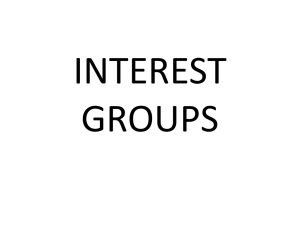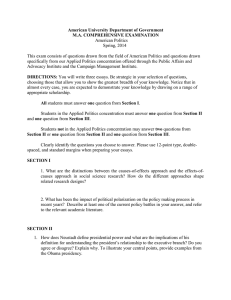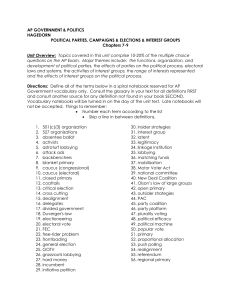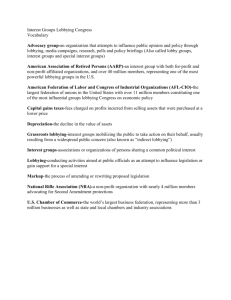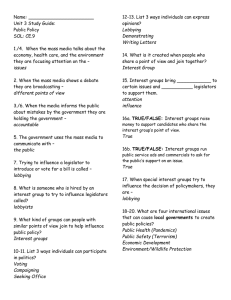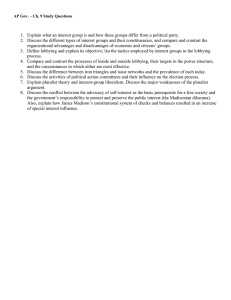American Politics/Applied Politics Spring, 2012
advertisement
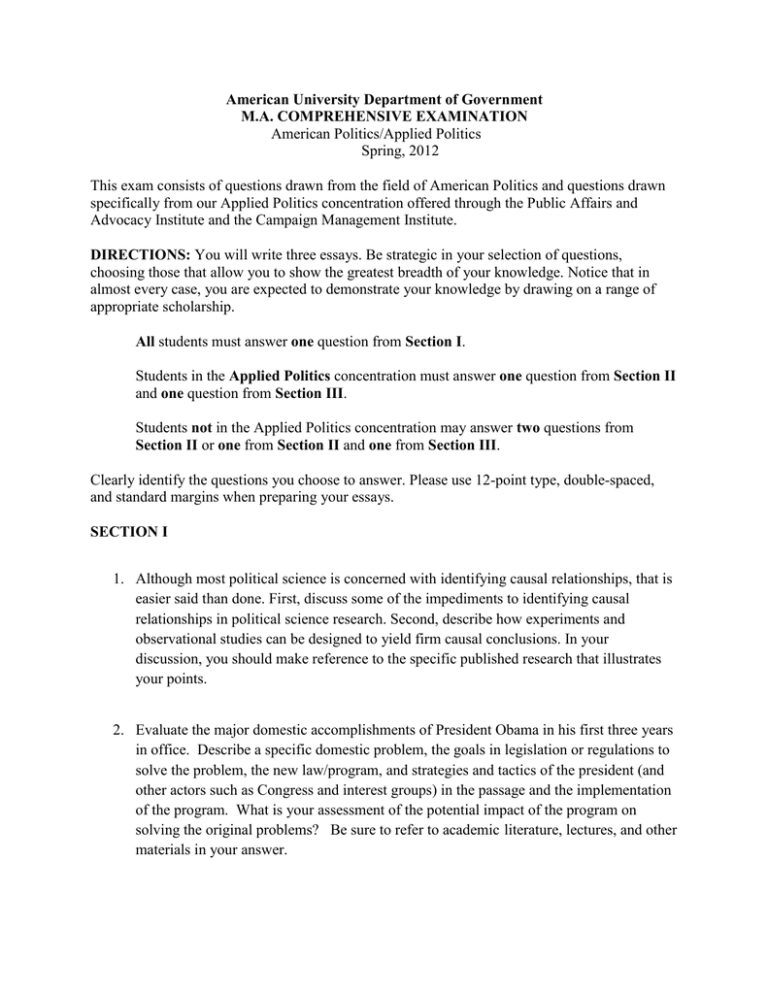
American University Department of Government M.A. COMPREHENSIVE EXAMINATION American Politics/Applied Politics Spring, 2012 This exam consists of questions drawn from the field of American Politics and questions drawn specifically from our Applied Politics concentration offered through the Public Affairs and Advocacy Institute and the Campaign Management Institute. DIRECTIONS: You will write three essays. Be strategic in your selection of questions, choosing those that allow you to show the greatest breadth of your knowledge. Notice that in almost every case, you are expected to demonstrate your knowledge by drawing on a range of appropriate scholarship. All students must answer one question from Section I. Students in the Applied Politics concentration must answer one question from Section II and one question from Section III. Students not in the Applied Politics concentration may answer two questions from Section II or one from Section II and one from Section III. Clearly identify the questions you choose to answer. Please use 12-point type, double-spaced, and standard margins when preparing your essays. SECTION I 1. Although most political science is concerned with identifying causal relationships, that is easier said than done. First, discuss some of the impediments to identifying causal relationships in political science research. Second, describe how experiments and observational studies can be designed to yield firm causal conclusions. In your discussion, you should make reference to the specific published research that illustrates your points. 2. Evaluate the major domestic accomplishments of President Obama in his first three years in office. Describe a specific domestic problem, the goals in legislation or regulations to solve the problem, the new law/program, and strategies and tactics of the president (and other actors such as Congress and interest groups) in the passage and the implementation of the program. What is your assessment of the potential impact of the program on solving the original problems? Be sure to refer to academic literature, lectures, and other materials in your answer. SECTION II 1. James David Barber’s 1972 work The Presidential Character examined the early lives of the presidents in an attempt to figure out how they might behave as chief executive. How is Barber’s classic study different from -- or similar to -- works by other prominent presidency scholars (Rossiter, Neustadt, Greenstein, etc.)? What are the Barber book’s main contribution to scholarship? 2. There is consensus about viewing elected officials in Congress as behaving out of self interest. Imagine yourself the chief of staff to a House member from a politically heterogeneous district who seeks success at home and in Washington. What advice would you offer to your boss? Draw on pertinent scholarship. Note any changes in your advice should your boss be a senator and not a House member. 3. Some scholars claim that political polarization in the American electorate has become more pronounced and more serious in the past decade. Others assert that political activists and elites are highly polarized, but that the electorate tends to be moderate and dissatisfied with candidates who reflect more extreme views. Which side has the stronger case to argue based on research? 4. There is widespread agreement among scholars that while various institutional forces can make it difficult to make formal changes in congressional rules, Members of Congress often adapt their practices in order to use rules for strategic benefit. Reconciliation is one particular procedural device that has been used in a variety of contexts and with varying levels of controversy. Describe and explain this procedure and how it has evolved from a process regarded as maximizing participation for Members and committees in both chambers in its early uses, to one that is now primarily seen as a device for allowing the majority in the Senate to limit participation by the minority. Rely on both the historical record and scholarship to bolster your argument. SECTION III – Applied Politics 1. Outline the elements of an effective advocacy/lobbying plan. Discuss the importance of the development and management of a strategic game plan; research and analysis of policy and process; the role of communications/media (earned and purchased), social media, the Internet strategy and its impact on lobbying; grassroots/grass tops lobbying; coalition building and maintenance; knowledge of the rules, regulations, and ethics in the lobbying environment; use of election campaign funding in lobbying; and direct lobbying of Congress and the executive branch. What are the major correlates of success and failure? Draw specific examples in your answer from lectures, readings, and your own research and lobbying plans. 2. How important is targeting in campaigns? Describe why it is/is not important, and give specific examples to illustrate your argument.

